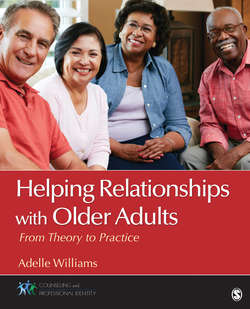Читать книгу Helping Relationships With Older Adults - Adelle M. Williams - Страница 29
На сайте Литреса книга снята с продажи.
Taste
ОглавлениеTaste helps all of us recognize when food is good or bad. When an elderly person loses taste, it can cause a loss of appetite, weight loss, poor nutrition, weakened immunity, and even death (Sollitto, 2015). When older persons lose the ability to taste certain foods, they may also lose interest in eating them, which could affect the amount of nutrients they consume, and they could accidentally consume food that has gone bad or contains harmful ingredients (Orenstein & Marcellin, 2015). Mental health professionals can refer older adults to a nutritionist. They can also provide ways to make meals more enjoyable by eating with others, teaching the use of herbs and spices, experimenting with new foods. Mental health professionals are able to develop programs with older persons to educate and monitor progress toward healthier dietary habits.
Older adults will experience a reduction in their taste sensation. Taste buds diminish; perception of salty and sweet tastes decrease first, followed by bitter and sour tastes. The volume and quality of saliva diminish. Such changes combine to make eating less interesting. These aging changes are compounded by common diseases (periodontal) and medications (Besdine & Wu, 2008).
This decreased taste sensation leads to a change in the type of foods that older people prefer. They generally like highly seasoned foods or simply more sugar or salt in food so it can be tasted. The ability to taste and smell starts to diminish when individuals are in their 50s. Both senses are needed to enjoy the full range of flavors in food. The tongue can identify only five basic tastes: sweet, sour, bitter, salty, and umami (commonly described as meaty or savory). Also, the mouth tends to feel dry more often, partly because less saliva is produced, and dry mouth further reduces the ability to taste food.
Guided Practice Exercise 1.1 provides an opportunity to obtain the perception of taste sensation and its effect on adequate nutrition from an older adult. Adequate nutrition is critical to maintaining one’s health at all points in life.
Guided Practice Exercise 1.1
Visit an assisted living facility and interview an older adult regarding the changes in his or her sense of taste over time. Inquire as to what effect it has had on his or her nutritional intake and satisfaction with meals.
